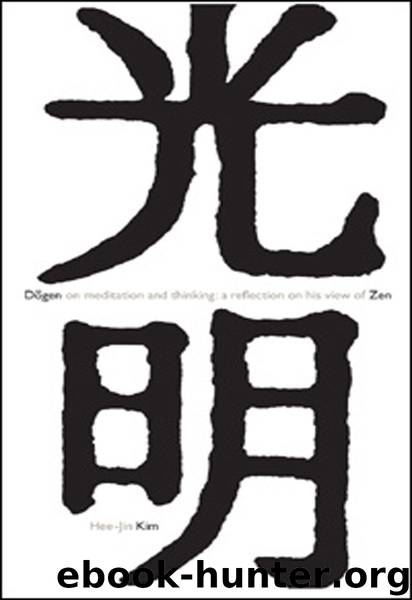Dogen on Meditation And Thinking: A Reflection on His View of Zen by Kim Hee-Jin

Author:Kim, Hee-Jin [Kim, Hee-Jin]
Language: eng
Format: epub
Publisher: State University of New York Press
Published: 2010-03-16T16:00:00+00:00
C HAPTER 5
Meditation as Authentic Thinking
1
Meditation and thinking are among the most vexatious subject matters in Zen Buddhism, specifically in S t Zen. Within the S t tradition, the mainstream view holds that seated meditation in terms of zazen-only (shikan taza ) is the foundation of what its upholders call “D gen Zen,” 1 either transcendentalizing or minimizing thinking; as a result, thinking has been almost incapacitated in the tradition. On the other hand, Critical Buddhism, as touched on before, radically challenges the orthodox veneration of zazen-only and its kindred notions as the sine qua non of D gen’s religion, which its proponents insist is to be read strictly in terms of wisdom/intellect (prajñ ), not meditation (dhy na ). D gen’s alleged anti-hongaku stance is also read as the norm. 2 From very early on in Buddhist history, there have been tensions between the bhaktic and gnostic approaches, as well as between the sam dhi-oriented and prajñ -oriented ways; 3 also well known are those between the doctrinal/scriptural and meditational schools in Chinese Buddhism, and between silent-illumination zen (mokush -zen ) and k an-introspection zen (kanna-zen ) in Ch’an/Zen. In view of this, the recent controversy within S t Zen may not be so surprising. It nevertheless is indicative of the potential for the issue of meditation and thinking to arouse an intense controversy as never before. Indeed, they are still odd bedfellows today more than ever.
On this issue, where did D gen himself stand? To what extent was he the meditator of zazen-only? Was zazen-only just zazen only to him? In his Sh b genz why does D gen the meditator seem to recede to the background, whereas D gen the thinker comes to the foreground? If this impression is correct, is it to be regarded as ironic? Did D gen the thinker dispense with zazen altogether and devote himself to writing the Sh b genz ? Unfortunately, textual and historical studies of D gen do not provide fully satisfactory answers to these questions. Even so, a clue to them seems to lie in his concept of nonthinking (hi-shiry ), along with those of thinking (shiry ) and not-thinking (fu-shiry ). What then does D gen mean by nonthinking?
In recent D gen/Zen studies, some scholars have attempted to explore the notion of nonthinking. For example, Izutsu Toshihiko, generally in line with D. T. Suzuki’s radically intuitionistic approach to Zen, insists upon “mistrust in thinking” and “elimination of discursive thinking” quite explicitly, because thinking is the most serious impediment to spiritual realization. He further suggests a thinking (“A-thinking,” “a-thinking thinking”) that operates in a totally different form and at quite a different level of consciousness from the one we are familiar with in our daily experience; it is activated by wiping out all images, ideas, and concepts from one’s consciousness—by opening up to the primordially undifferentiated as the ground of all things prior to their differentiation. This undifferentiated is not a blank slate of consciousness, but mindfulness, through which
Download
This site does not store any files on its server. We only index and link to content provided by other sites. Please contact the content providers to delete copyright contents if any and email us, we'll remove relevant links or contents immediately.
The Way of Zen by Alan W. Watts(6600)
Ego Is the Enemy by Ryan Holiday(5412)
The Art of Happiness by The Dalai Lama(4124)
The Book of Joy by Dalai Lama(3972)
Why Buddhism is True by Robert Wright(3446)
Spark Joy by Marie Kondo(3298)
Shift into Freedom by Loch Kelly(3192)
Happiness by Matthieu Ricard(3040)
A Monk's Guide to a Clean House and Mind by Shoukei Matsumoto(2902)
The Lost Art of Good Conversation by Sakyong Mipham(2640)
The Meaning of the Library by unknow(2564)
The Unfettered Mind: Writings from a Zen Master to a Master Swordsman by Takuan Soho(2301)
The Third Eye by T. Lobsang Rampa(2257)
Anthology by T J(2206)
Red Shambhala by Andrei Znamenski(2192)
The Diamond Cutter by Geshe Michael Roach(2058)
Thoughts Without A Thinker: Psychotherapy from a Buddhist Perspective by Epstein Mark(2011)
Twilight of Idols and Anti-Christ by Friedrich Nietzsche(1888)
Advice Not Given by Mark Epstein(1878)
